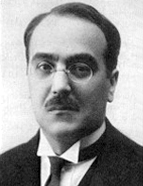

His official public recognition came in 1957 with the award of the Grã-Cruz do Cruzeiro do Sul [Grand Cross of the Order of the Southern Cross] (Brazil) and the Grande Oficialato de Santiago da Espada [Grand Officer of the Order of Saint James of the Sword] (Portugal). He received an award from the Diário de Notícias for his literary oeuvre, and his book Um Homem na sua Humanidade [A Man in His Humanity] was launched.
Fidelino de Figueiredo was in constant dialogue with the intellectual elite of his time, as attested by his extensive correspondence. He was also a regular contributor to national and foreign newspapers and journals, with articles published in over 120 periodicals.
Fidelino's political involvement only lasted until 1927, when he took part in an attempted military coup (the "Fifis" coup), which led to his imprisonment and exile. He was a politician of secondary importance in the 1st Republic. Seen as a man of culture, his speeches focused on defending an attitude of ethical and ideological coherence. He was an outspoken conservative and nationalist and in 1915, as well as being a member of Brito Camacho's Republican Union, he also joined the National League. In 1918, he left the party when the Unionists stopped supporting Sidónio Pais. He ran for the Lisbon City Council elections (November 4, 1917), was an assemblyman (1918-19) and a candidate for parliament (1921, 1922 and 1925). Following the path of Sidonism, he joined the Conservative Republican Party in 1919. In the events of October 19, 1921 ("Bloody Night"), Fidelino was on the list of personalities to be arrested and possibly murdered, which did not occur owing to the fact that he was not at home. It was from then on that his political stance became more radical, more "out of protest against the Republic", and he became more aligned with the Monarchist Cause, where he collaborated as an independent on the electoral lists (1921 and 1922) and as a fully-fledged candidate in this political area in 1925.
As an opponent of parliamentarianism, he saw in the military dictatorship the possibility of overcoming the political crisis that was dragging down the liberal regime. However, he soon became disillusioned with its lack of direction and, above all, the lack of strong political leadership on the part of the new rulers. It was on this basis that he took part in the unsuccessful coup attempt (12-08-1927) which would mark the end of his active political involvement.
